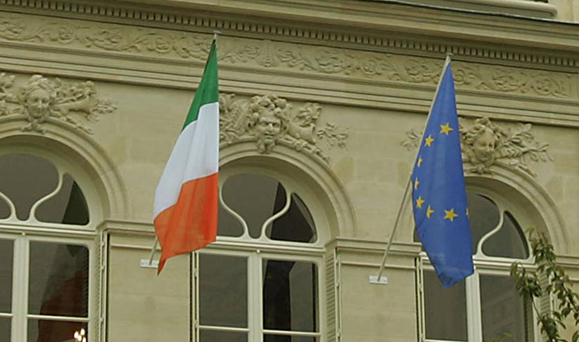The New Year marked the start of Ireland’s six-month presidency of the Council of the European Union. The transition began with a ceremony at Dublin Castle on New Year’s Eve, at which Taoiseach Enda Kenny, Táiniste Eamon Gilmore and Minister of State for European Affairs Lucinda Creighton laid out Ireland’s agenda for the months ahead.
Kenny emphasized that the presidency offers Ireland a prime chance to strengthen bonds within the EU, and that it would bring “new hope, new possibility, new confidence to our people.
“The Irish presidency in 2013 will be about three crucial words: stability, jobs and growth,” he said, outlining Ireland’s focus for the presidency. “There are real actions to back up those three words. We will be in the business of solution, a recovery country, driving recovery in Europe.”
Ireland last held the presidency, which rotates between the EU member countries twice each year, in 2004, in a markedly different financial climate both nationally and throughout the European Union. It was a time of possibility and expansion for the EU, as 10 new countries – Cyprus, the Czech Republic, Estonia, Hungary, Latvia, Lithuania, Malta, Poland, Slovakia and Slovenia – were granted entry into the Union.
This time around, only Croatia will have its final monitoring report reviewed in anticipation of its accession to the EU in July. Turkey, Montenegro, Albania, Macedonia and Serbia will also have a chance to further present their cases for joining.
Issues surrounding debt relief, future budgets and the European banking union will loom large, as will questions of trade. As Ireland also recently began its three-year term as part of the European Human Rights Council, human rights strategy is set for the agenda. With the 2015 target for the Millennium Development Goals drawing nearer, the goals will be the subject of an international conference in Dublin in April.
The Irish government plans to spend €60 million over the six month period – over one-third less than it spent during the 2004 presidency. It will chair approximately 1,600 meetings of the EU council, 180 of which will take place in Ireland. The government was quick to assert that only buildings it owns will be used, in order to avoid unnecessary costs.
The presidency coincides with the 40th anniversary of Ireland’s accession to the EU, or the European Economic Community, as it was called in 1973.


Leave a Reply